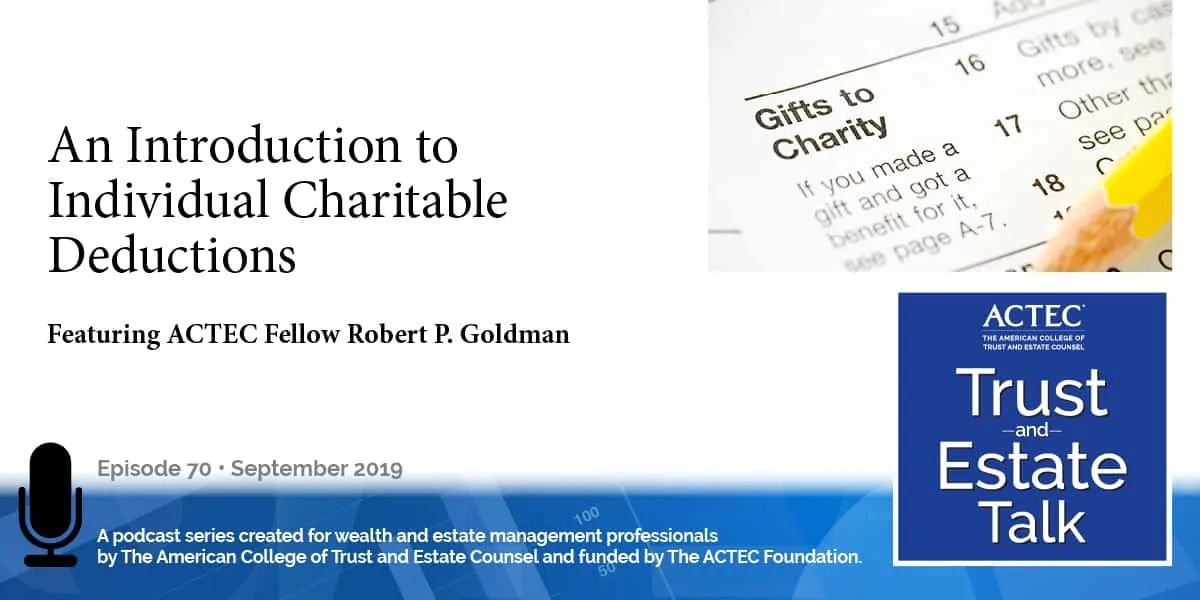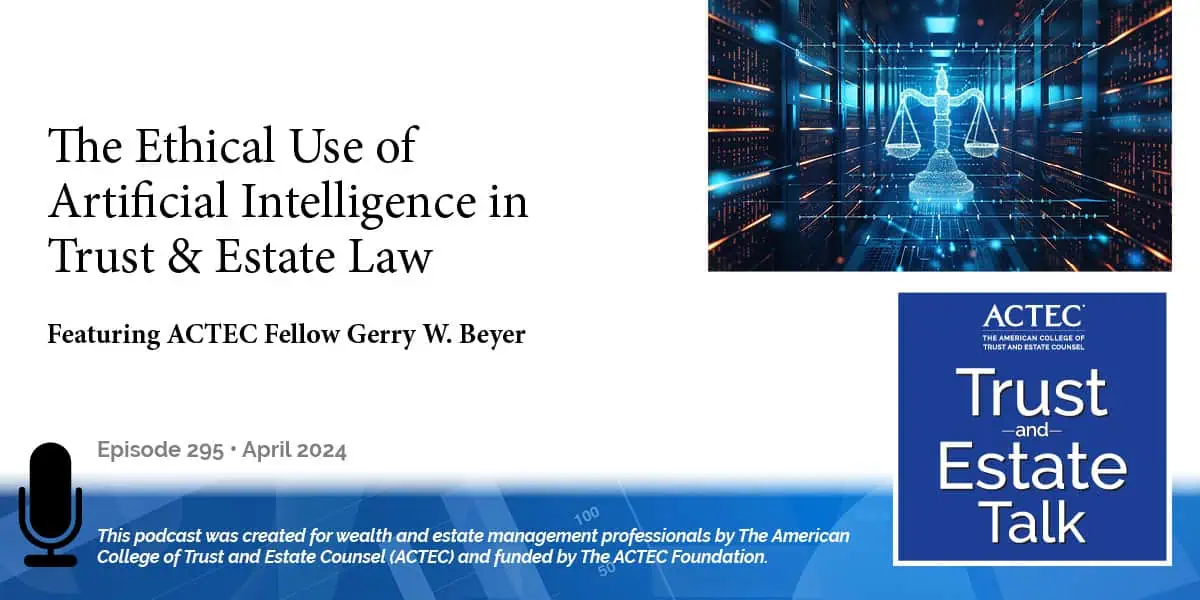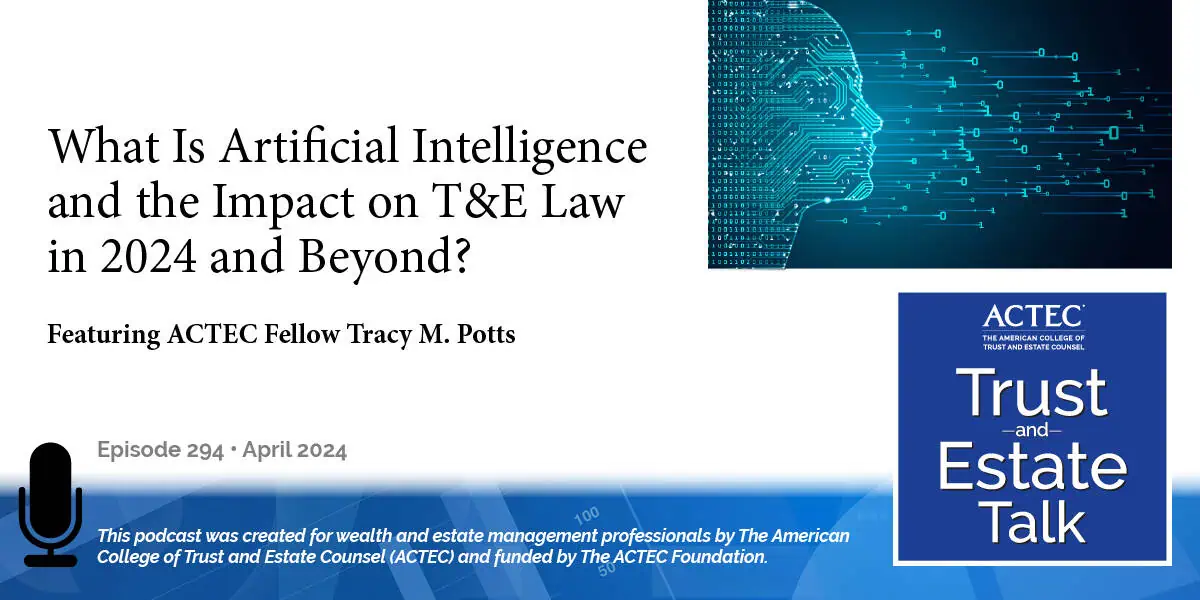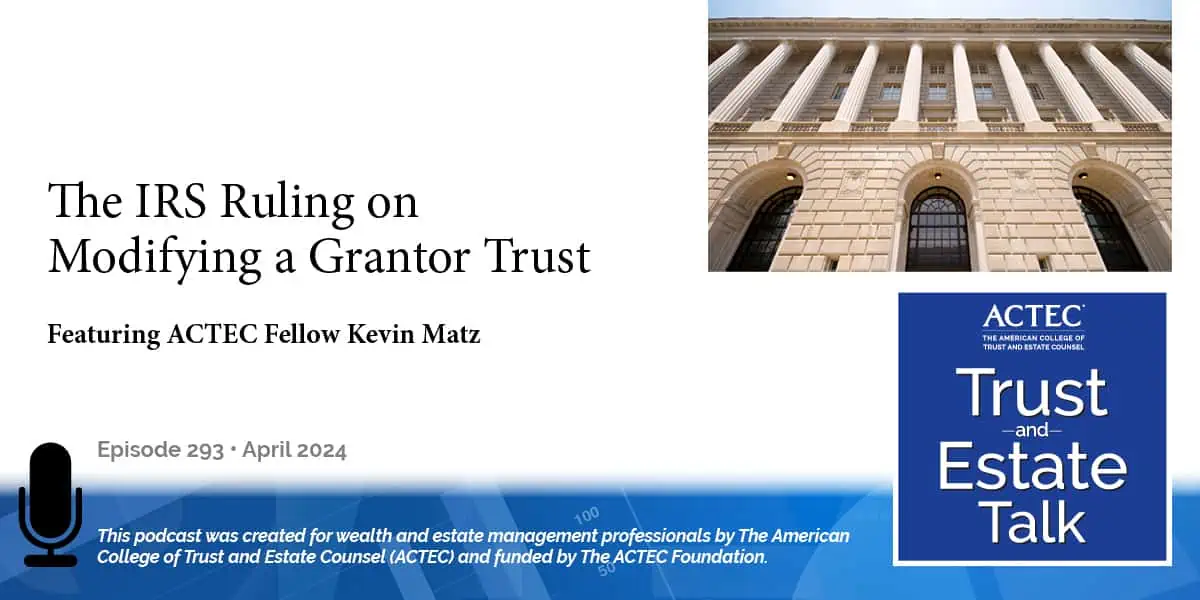An Introduction to Individual Charitable Deductions

“An Introduction to Individual Charitable Deductions,” that’s the subject of today’s ACTEC Trust and Estate Talk.
Transcript/Show Notes
This is Natalie Perry, ACTEC Fellow from Wheaton, Illinois. To give us an introduction to the rules that govern individual charitable deductions, you will be hearing today from ACTEC Fellow Bob Goldman of Salem, Massachusetts. Welcome, Bob.
Thanks. Today I am mostly speaking about the income tax charitable deduction for individuals. There is also a gift tax and an estate tax charitable deduction, and generally the requirements are the same. We have to make a contribution to or for the use of certain kinds of organizations. Generally, a corporation or a trust that has been organized and operated exclusively for religious or charitable or scientific or literary or educational purposes. There are some other categories as well. Generally, you know a charitable organization when you see it. It certainly includes social service organizations, cultural organizations; a lot of these organizations fall into the category of educational. No part of the net earnings of such an organization can benefit a private shareholder or individual.
Of course, the organization can benefit an individual who is needy and is a client of the services being provided, but not an unrelated individual who is trying to profit off of the organization. And, these kinds of organizations cannot be disqualified by reason of participating in any political campaign or conducting lobbying beyond the minimal amount that might otherwise be allowed of a charitable organization.
Well, one difference between the income and gift and estate tax deductions is that, for income tax purposes, we can deduct a charitable gift only if this corporation or trust is created or organized in the United States or under United States’ state law. Whereas – and not-for-foreign charities, that’s the point – whereas we get a gift and estate tax deduction even if we are giving to a foreign charity. That’s why we see so many, what I call friends of foreign charity, organizations out there. These organizations that might dedicate all their grant making to a foreign charity, but because they are organized here in the U.S., we get the income tax deduction.
Now, before I get into the complexity of limitations, I have to point out that when we fill out our income tax returns and we go to the deductions, we are going to choose between a standard deduction or we are going to itemize our deductions. And, charitable deductions are part of the itemized deductions. So, it turns out that if you are choosing the standard deduction, you are not itemizing, and you are not claiming any charitable deductions. A lot of people out there don’t understand this. I see many of my friends who never are going to itemize their deductions because their possible total of their itemized deductions is just less than the standard deduction. They are going to take the standard deduction, but the same friends love to talk about how they got their receipts for their charitable contributions and they are motivated by that deduction, and I often don’t want to break their heart by letting them know that they are never going to be claiming an income tax deduction. And this is more relevant than ever, because under the Tax Cuts and Job Act signed by President Trump in December of 2017 and effective on January 1 2018, substantially increased the standard deduction meaning that fewer and fewer people are going to ever be itemizing their deductions.
Indeed, the standard deduction for single filers went from $6,350 to $12,000, almost doubled. And for married filers, it went from $12,700 to $24,000, again, almost doubled. So, for these married filers for example, they would need itemized deductions including charitable deductions in excess of $24,000 before they would ever consider itemizing rather than just taking that standard deduction. And further, the Tax Cuts and Jobs Act reduced the ability to use other historic itemized deductions. There are now limitations on deducting your mortgage interest, limitations on deducting your state and local taxes and because of this, the standard deduction is just going to be more attractive to yet more people. Well, Congress did not want us to be able to wipe out our taxable income with the charitable deductions. So, when we are itemizing, we are going to be able to take charitable deductions only subject to limitations.
There are two kinds of limitations I want to discuss, and I will first discuss the percentage limitations. They are only going to let us deduct up to a certain percentage of our adjusted gross income using the charitable deduction. If we contribute more than this limitation, we get to carry forward the excess contributions for up to five years. The general rules before the new Tax Cuts and Jobs Act were, and primarily still are, that we can deduct cash gifts to public charities up to 50 percent of our adjusted gross income. A public charity would include churches and similar religious organizations, schools, colleges and universities, hospitals and organizations that receive up to one-third of their support, that normally receive up to one-third of their support, from the general public. And this can include organizations that also receive up to one-third of their support from fees received in return for the charitable services they provide. So if you are giving cash to one of those public charities, the rule was that you could deduct up to 50 percent of your adjusted gross income in any one year, carry forward the balance, the excess and now, under the new Tax Act effective in 2018, but sun setting away from us starting in 2026, we can deduct up to 60 percent of our adjusted gross income in any one tax year carrying forward any excess.
If you are giving a cash gift to anything other than a public charity, then your deduction is going to be limited to 30 percent of your adjusted gross income in any one tax year. And when aggregated to cash gifts you made to a public charity, your total deductions still have the historic 50 percent limit. It’s complicated.
Meanwhile, if you are giving long-term capital gain property to a public charity, that kind of contribution is limited to its deductibility in any one tax year to 30 percent when given to a public charity of your adjusted gross income. Again, when aggregated to those cash gifts you made to public and non-public charities limited in the aggregate to 50 percent. And finally, long-term capital gain property when given to non-public charities limited to 20 percent of your adjusted gross income.
Now, there is another limitation and that has to do with whether your gift is deductible at its fair-market value or whether you are limited to deducting only your basis in the property. And, of course, for many donors a deduction limited to basis in property is a non-starter. That’s of little interest to them. So, we have to pay careful attention to these rules.
Generally, when giving to a public charity of long-term gain property, you get to deduct the fair-market value, but when giving to a non-public charity, you are going to be limited to your basis in the property. And that has one important exception, which is that gifts of publicly traded securities, marketable securities, long-term gain assets can be donated to a private foundation and other non-public charities with a fair-market value deduction.
A few other things to know about the deduction, you need to have a contemporaneous receipt from the charity if your gift is over $250. So, you are simply not allowed your deduction and could easily be denied on audit if you don’t have in your own files that receipt. Also, you get no deduction for what are known as quid pro quo contributions. If you are getting any benefit back from the charity, you can’t deduct the value to the extent of the benefit and the charities are required to tell you on their contemporaneous receipt whether they provided you with any goods or services in return for your contribution and the value. Other things that we need to keep in mind are that if you are giving property, you may be required to have an appraisal, what’s known as a qualified appraisal from a qualified appraiser. So, you will want to check out those rules. If you are above a certain value, you are going to need a qualified appraisal and submit a Form 8283, which is really a summary of the appraisal, not the full appraisal itself, but you have to attach the summary to your income tax return.
A few other things of interest I would like to throw in here are that, come up when you are giving a partial interest in property. If you want to give a partial interest in property, make sure it’s what’s known as an undivided interest or fractional interest. I can give 20 percent of my partnership interest to charity and deduct it, but I can’t give an undivided interest, what I would like to call a temporal interest, and think I am going to get a deduction. I am not. For example, when I contribute to my favorite charity a one-week use of my vacation home, so they can auction it off, no charitable deduction, because it’s the kind of partial interest that’s not an undivided interest.
I think I’ll wrap up by mentioning that we get a break from the taxation on required minimum distributions from IRAs and qualified retirement plans if we are over 70 and a half and we donate, to the extent we donate, any part of the required minimum distribution to a public charity. We don’t get a deduction for that transfer to charity from our IRAs and qualified plans, but nor do we have to include this portion going to charity into our adjusted gross income. So, for folks that are not itemizing charitable deductions anyway, this is a chance to actually get the equivalent of an extra charitable deduction. You can take your full standard deduction and arrange for your required minimum distribution to go to charity and not have to pay tax on that distribution. And I think I’ll stop there.
Thank you, Bob, for educating us on rules around charitable income tax deductions for individuals. That was great.
This podcast was produced by The American College of Trust and Estate Counsel, ACTEC. Listeners, including professionals, should under no circumstances rely upon this information as a substitute for their own research or for obtaining specific legal or tax advice from their own counsel. The material in this podcast is for information purposes only and is not intended to and should not be treated as legal advice or tax advice. The views expressed are those of speakers as of the date noted and not necessarily those of ACTEC or any speaker’s employer or firm. The information, opinions, and recommendations presented in this Podcast are for general information only and any reliance on the information provided in this Podcast is done at your own risk. The entire contents and design of this Podcast, are the property of ACTEC, or used by ACTEC with permission, and are protected under U.S. and international copyright and trademark laws. Except as otherwise provided herein, users of this Podcast may save and use information contained in the Podcast only for personal or other non-commercial, educational purposes. No other use, including, without limitation, reproduction, retransmission or editing, of this Podcast may be made without the prior written permission of The American College of Trust and Estate Counsel.
If you have ideas for a future ACTEC Trust & Estate Talk topic, please contact us at ACTECpodcast@ACTEC.org.
Latest ACTEC Trust and Estate Talk Podcasts

The Ethical Use of Artificial Intelligence in Trust & Estate Law
A law professor offers insights into the risks, rewards, duties and ethical considerations of lawyers using AI in their T&E practices.

What Is Artificial Intelligence and the Impact on T&E Law in 2024 and Beyond?
A primer on the types and uses of AI, then a deeper dive into the impact on trust and estate law from types to applications to ethical considerations.

The IRS Ruling on Modifying a Grantor Trust
Explore the gift tax implications for trust beneficiaries modifying grantor trusts in IRS CCA 202352018, with nuanced analysis and estate planning insights.

